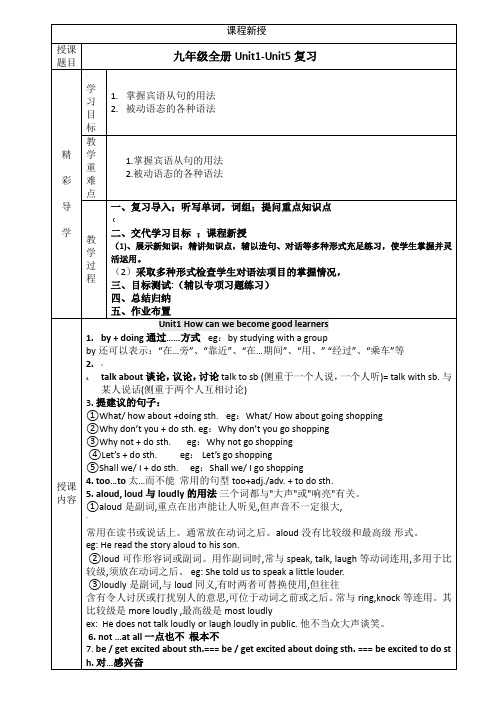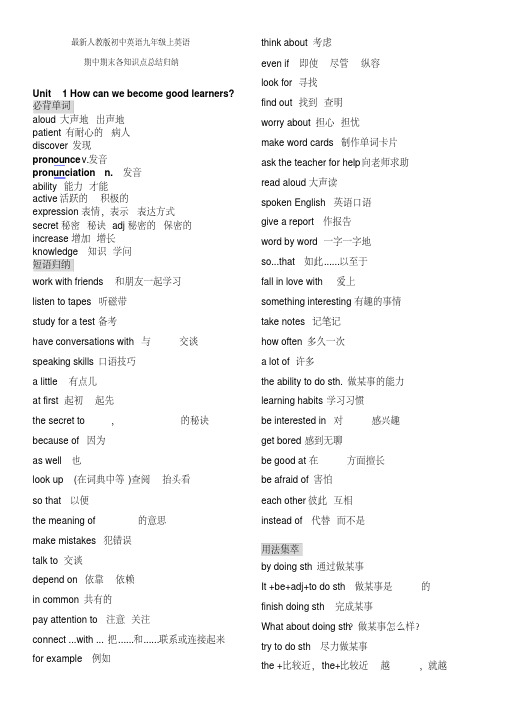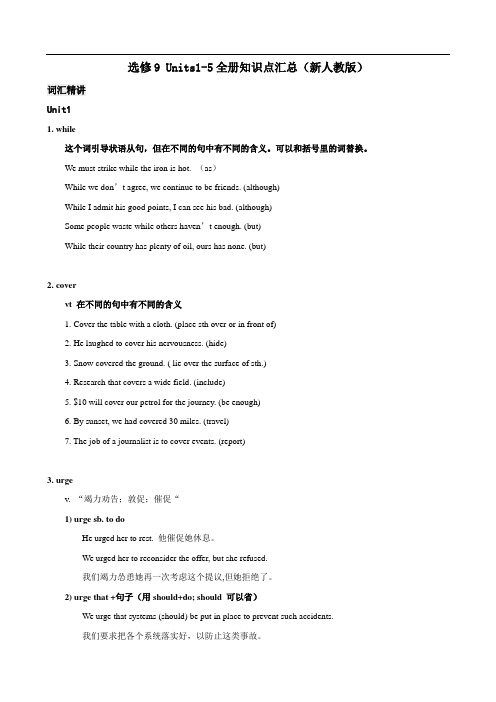人教版英语九年级1-5复习讲义(无答案)
- 格式:doc
- 大小:45.00 KB
- 文档页数:6

Unit 1通过向老师求助the teacher help. 要求某人做某事ask sb. (do)sth. 2和朋友用英语交谈She can sing,and she can dance,(也),She can sing,and she can (也)dance.He didn know the answer.I didn't know,(也)14 I (发现)that(听有趣的事情)25connect -- (n.)26不断练习他们所学到的keep what they have learned28寻找方法来复习ways29wisely —(adj.明智的)conversations friends (be)the secret language learning. 30 自己your ownEnglish.3 What about (大声朗读)?15 in a dictionary(.查阅它们)在字典里31 用:see our eyes and hear our ears.sing English4 英语口语English 16 (为了+从句)improve my English reading a lot. 一个讲英语的国家an (为了+动词原型)country5读完一本书finish (read)a book6对某人有耐心be sb.7有耐心的(adj.)—耐心地(adv.)—耐心(n.)8(越多)you read,you'll be.9发现学英语很难find difficult English.10I was (害怕去问)questions(因为)my poor pronunciation. 17通过记笔记、做练习和大量阅读。
By ,doing andreading .18physics—(n.物理学的,身体的)19increase 增长了increase 增长到20——我没有一起练习英语的伙伴。

人教九年级Units1- 5单元复习一、单项选择1. —How can I improve my reading skills?—You can read more books ________.A. in a hurryB. in this wayC. in the endD. in fact2. It's important for us to learn English ________.A. goodB. wellC. niceD. fine3. —I often make mistakes ________ grammar.—You should do more grammar exercises.A. inB. atC. forD. to4. I like these photos because they can me _________the life living in America.A. think; ofB. let; downC. remind; ofD. wake; up5. The policeman warns him that in the future.A. doingB. didC. not to doD. do6. —The dragon boat races are so exciting, but our boat is still behind.—Don't worry. I am sure our team will win!A. whoB. thatC. whetherD. why7.—I plan to go climbing tomorrow, but I don’t know ________. —The weather report says it will be sunny.A.what the weather was likeB.what the weather will be likeC.how the weather isD.how the weather was8.—Have you decided ________ to hold the class meeting? —Yes, it will be held tomorrow morning.A.where B.how C.when D.why9.A lot of trees ________ on the hill yesterday.A.are planted B.will be plantedC.have been planted D.were planted10.We find ________ impossible for US to learn a foreign language well in a short time.A.that B.this C.one D.it11.—Have you finished your book report yet?—No, I haven’t. I plan ________ it this weekend.A.write B.wrote C.writing D.to write12. -What do you think of _______? -They’re OK.A. talk showB. a talk showC. the talk showD. talk shows13. —How do you like soap operas, Lily?—I can't _____ them. They're boring.A. standB. touchC. mindD. think14.My grandmother _______ a lot of changes in Tianjin since she came here.A.sees B.can see C.will see D.has seen 15.—_______ you _______ go to school by bike?—Yes.But now I usually go to school by bus.A.Did;use to B.Were;used toC.Do;use to D.Will;use to二、用所给词的适当形式填空。

3)当从句所表示的是客观事实或客观真理时,该从句都用一般现在时,不用过去时。
如:He said light travels much faster than sound.3、宾语从句中的否定转移。
如果主句谓语动词是think ,believe suppose 等,而从句的意思是否定的,这时主句的谓语动词用否定式,从句用肯定式。
如:I don’t think you are right.我认为你不对。
4、将普通的特殊疑问句变成宾语从句时,从句的语序要由疑问句变成陈述句的语序。
When will the meeting begin I want to know when the meeting will begin.5、将普通的一般疑问句变成宾语从句时,则用if /whether连接,同时变成陈述句语序。
Are you an English teacher -He asked if I was an English teacher.在下列情况下只能用whether1)介词后的宾语从句I’m thinking about whether we should go fishing.?2)宾语从句提前时Whether this is true or not,I can’t say.3)直接与or not连用时I don’t know whether or not he was ready.4)在带to 的动词不定式前She hasn’t decided whether to go or not.if也可引导条件状语从句,表示“如果”(主将从现,主过从过)。
比较:I don’t know if he will come.If he comes ,I will tell you.6、在变宾语从句时,要注意以下几点。
1)连接词2)人称3)语序4)时态5)标点Unit5 What are the shirts made of1.辨析 be made of (物理变化,能看出原材料)由..制成be made from(化学变化,看不出原材料)be made in+地点由……地方制造This watch is made in Switzerland.be made into 被制成……Silk can be made into beautiful cloth.be made up of由…组成(指结构成分)China is made up of 56 nations.Be made by..被(某人)..制成2. be famous/known for 因……而著名《be famous/known as 作为……而著名eg: Lu Xun is famous for his great novels.covered with被..覆盖In trouble 遇到麻烦By hand 用手matter常用作连词词组,作“不管,不论”讲,后接what/who/when等词,引导让步状语从句,应注意:1)从句的时态no matter what / who / when表示无论在什么条件下进行随意的选择,都会出现主句所发生的情况,因此,从句中可用一般现在时表示未发生的动作。

最新人教版初中英语九年级上英语期中期末各知识点总结归纳Unit 1 How can we become good learners? 必背单词aloud 大声地出声地patient 有耐心的病人discover 发现pronounce v.发音pronunciation n. 发音ability 能力才能active活跃的积极的expression 表情,表示表达方式secret 秘密秘诀adj秘密的保密的increase 增加增长knowledge 知识学问短语归纳work with friends 和朋友一起学习listen to tapes 听磁带study for a test 备考have conversations with 与···交谈speaking skills 口语技巧a little 有点儿at first 起初起先the secret to···,·····的秘诀because of 因为as well 也look up (在词典中等)查阅抬头看so that 以便the meaning of ···的意思make mistakes 犯错误talk to 交谈depend on 依靠依赖in common 共有的pay attention to 注意关注connect ...with ... 把......和......联系或连接起来for example 例如think about 考虑even if 即使尽管纵容look for 寻找find out 找到查明worry about 担心担忧make word cards 制作单词卡片ask the teacher for help 向老师求助read aloud 大声读spoken English 英语口语give a report 作报告word by word 一字一字地so...that 如此......以至于fall in love with 爱上something interesting 有趣的事情take notes 记笔记how often 多久一次a lot of 许多the ability to do sth. 做某事的能力learning habits 学习习惯be interested in 对···感兴趣get bored 感到无聊be good at 在···方面擅长be afraid of 害怕each other 彼此互相instead of 代替而不是用法集萃by doing sth 通过做某事It +be+adj+to do sth 做某事是···的finish doing sth 完成某事What about doing sth?做某事怎么样?try to do sth 尽力做某事the +比较近,the+比较近越···,就越···find it+adj+to do sth 发现做某事be afraid of doing sth 害怕做某事help sb (to) do sth 帮助某人做某事practice doing sth 练习做某事keep doing sth 一直做某事be afraid to do sth 害怕做某事begin to do sth 开始做某事want to do sth 想要做某事need to do sth 需要做某事remember to do sth 记得做某事shoot 射(射着,射死等表结果)shoot at(瞄准)射语法全解一、how询问方式、方法,意为“怎样、如何”。

选修9 Units1-5全册知识点汇总(新人教版)词汇精讲Unit11. while这个词引导状语从句,但在不同的句中有不同的含义。
可以和括号里的词替换。
We must strike while the iron is hot. (as)While we don’t agree, we continue to be friends. (although)While I admit his good points, I can see his bad. (although)Some people waste while others haven’t enough. (but)While their country has plenty of oil, ours has none. (but)2. covervt 在不同的句中有不同的含义1. Cover the table with a cloth. (place sth over or in front of)2. He laughed to cover his nervousness. (hide)3. Snow covered the ground. ( lie over the surface of sth.)4. Research that covers a wide field. (include)5. $10 will cover our petrol for the journey. (be enough)6. By sunset, we had covered 30 miles. (travel)7. The job of a journalist is to cover events. (report)3. urgev. “竭力劝告;敦促;催促“1) urge sb. to doHe urged her to rest. 他催促她休息。

九年级英语上册第 1-5 单元复习要点一、短语。
1. by making flashcards 通过做单词抽认卡2. askfor help 向某人求助3. read aloud 朗读4. that way (=in that way) 通过那种方式5. improve my speaking skills 提高我的会话技巧6. for example 例如?7. have fun doing sth 玩得高兴 conversations with friends 与朋友对话 9. get excited about 为 高兴,激动 up speaking in Chinese 以说汉语结束对话a survey about做 有关 的调查an English notebook 记英语笔记 English (= oral English) 英语口语 mistakes in sth 在犯错误the pronunciation right 使发音准确speaking English 练习说英语?of all 首先 with 以 开始on 随后?class 在课堂上 at 嘲笑notes 记笔记?doing 喜欢干down 写下,记下 up (v + adv) 查找,查询 speakers 说本族话的人 up 编造,虚构,化妆,打扮 the world 全世界with 对待,处理,解决 about (be worried about) 担心,担忧angry with 生某人的气 angry 生气by 消逝? 34. regardas 把 当做about/of 抱怨? 36. with the help of 在 的帮助下 to (with)把 和 作比较?of (think about) 想起,想到 at all 根本不,全然不 problems 身体上的问题 off 中断,突然终止?complete sentences 做完整的句子?加入某团体并成为其中一员;join in 与 take part in 指参加到某项活动中去。
2020年人教版英语九年级Unit 51.be made of…be made from…_be made in +地名_be made by sb. _be made up of…_be made out of…_make sb. do sth. _be made to do sth. _be seen/found/heard to do sth. _2.be famous for=_3.as far as I know=_4.all over the world_5.no matter what=_6. seem 的用法主语+ seem +(to be )+n./adj.Tom seems (to be )a very clever boy.Mr. Black seemed to be quite happy.主语+ seem + 不定式Mrs. Green seems to like the idea.The young man seemed to have changed much.It seems that从句”,其中it 是形式主语,It seems that no one knows what has happened in the park.7.avoid doing sth. _8.everyday things_9.turn …into…_10. according to _11. in trouble_in danger_12.cover…with…_be covered with…_13.paper cutting_14.a symbol of…_symbols of…_15.by hand_16.at a very high heat_17. environmental protection_Protect the environment_18. around China_19.high-technology products_20. go on a vacation_21.know about…_22. the international kite festival_ 23.the most common things_24. send for sb. _Send sth. out to…_Send sb/sth. to …_25. rise into the sir_26. see sb. as…_regard sb. as…_consider sb. as…_27.lively characters_28. The model plane is made of used wood and glass.29. The painting is made from grass, leaves and flowers.30. China is famous for tea in the past and now.31. When the leaves are ready, they are picked by handand then are sent for processing.32. He realized that Americans can hardly avoid buyingproducts made in China.33. He wishes that in the future China will also get betterat making high-technology products that people can buy in all parts of the world.34. Each different part of China has its own special formsof traditional art.35. The most common things, from paper to clay tobamboo, are turned into objects of beauty.36.They are seen as bright symbols of happiness and goodwishes.37.The pieces are carefully shaped by hand from a veryspecial kind of clay and then allowed to air-dry.38. It takes several weeks to complete everything.39. not only… but (also)… “不但…而且…”either…or…(表示两者中选一个)“或者…或者”neither…nor… “既不…也不…”以上3个短语,做主语时,谓语动词用就近原则。
Unit 1通过向老师求助the teacher help. 要求某人做某事ask sb. (do)sth. 2和朋友用英语交谈She can sing,and she can dance,(也),She can sing,and she can (也)dance.He didn know the answer.I didn't know,(也)14 I (发现)that(听有趣的事情)25connect -- (n.)26不断练习他们所学到的keep what they have learned28寻找方法来复习ways29wisely —(adj.明智的)conversations friends (be)the secret language learning. 30 自己your ownEnglish.3 What about (大声朗读)?15 in a dictionary(.查阅它们)在字典里31 用:see our eyes and hear our ears.sing English4 英语口语English 16 (为了+从句)improve my English reading a lot. 一个讲英语的国家an (为了+动词原型)country5读完一本书finish (read)a book6对某人有耐心be sb.7有耐心的(adj.)—耐心地(adv.)—耐心(n.)8(越多)you read,you'll be.9发现学英语很难find difficult English.10I was (害怕去问)questions(因为)my poor pronunciation. 17通过记笔记、做练习和大量阅读。
By ,doing andreading .18physics—(n.物理学的,身体的)19increase 增长了increase 增长到20——我没有一起练习英语的伙伴。
课程新授授课题目九年级全册Unit1-Unit5复习 学 习 1.掌握宾语从句的用法 目 2.被动语态的各种语法 标 ____ 五、作业布置 Unitl How can we become good learners? 1. by + doing 通过 .... 方式 eg : by studying with a group by 还可以表示: 在…旁” 靠近” 在…期间” 用、”经过” 乘车”等 2. talk about 谈论,议论,讨论talk to sb (侧重于一个人说,一个人听)=talk with sb.与 某人说话(侧重于两个人互相讨论) 3. 提建议的句子: ① What/ how about +doing sth.? eg : What/ How about going shopping? ② Why don' you + do sth.? eg Why don' you go shopping? ③ Why not + do sth. ? eg Why not go shopping? ④ Let ' + do sth. eg Let ' g s shopping ⑤ Shall we/ I + do sth.? eg Shall we/ I go shopping? 4. too …to 太…而不能 常用的句型too+adj./adv. + to do sth. 5. aloud, loud 与loudly 的用法 三个词都与"大声"或"响亮"有关。
① aloud 是副词,重点在出声能让人听见,但声音不一定很大, 常用在读书或说话上。
通常放在动词之后。
aloud 没有比较级和最高级 形式。
eg: He read the story aloud to his son.② loud 可作形容词或副词。
九年级上册英语Units 1-5知识点Unit 1 How can we become good learners?一、重点短语1. have conversation with sb. 同某人谈话2. too…to… 太……而不能3. the secret to… ……的秘诀4. be afraid of doing sth./ be afraid to do sth.害怕做某事5. look up查阅6. repeat out loud大声跟读7. make mistakes in在……方面犯错误8. connect……with…把……和……连接/联系起来9. get bored感到厌烦10. be stressed out焦虑不安的11. pay attention to注意;关注12. depend on取决于;依靠13. the ability to do sth.. 做某事的能力14. native speaker说本族语的人15. make up组成、构成16. decide to do sth. 决定做某事17. not…at all一点也不,根本不18. laugh at sb. 笑话;取笑(某人)19. take notes做笔记,做记录20. deal with处理21. talk about谈论,议论,讨论22.talk to sb / talk with sb与某人说话23.be / get excited about sth. 对…感兴奋24. first of all首先25. make mistakes犯错24each other彼此26. change… into… 将…变为…二、固定结构1. by + doing:通过……方式(做某事)(by是介词,后面要跟动名词即动词的ing形式,不能跟不定式)Eg. I study English by watching English movies2. end up doing sth : 终止做某事,结束做某事Eg:The party ended up singing. 晚会以唱歌而结束。
3)、由连词whether或if引导(口语中常用if)。
(一般疑问句)Could you tell me if it snows in Australia?
应注意的几个问题:
1.宾语从句可放在形容词后。
常用形式是be+形容词+宾语从句I am glad you like it .
2、宾语从句与主句时态的一致。
1)主句是现在(或将来)时态时,宾语从句可根据实际需要用不同的时态。
如:He says Mary is playing with the cat .He says Mary often plays with the cat.
He says Mary will play with the cat.I think he left yesterday morning.2)主句时态是一般过去时,从句要用过去时态的某种形式。
He said Mary was playing with the cat.He said he hoped to be back soon..3)当从句所表示的是客观事实或客观真理时,该从句都用一般现在时,不用过去时。
如:He said light travels much faster than sound.
3、宾语从句中的否定转移。
如果主句谓语动词是think , believe suppose 等,而从句的意思是否定的,这时主句的谓语动词用否定式,从句用肯定式。
如:
I don’t think you are right.我认为你不对。
4、将普通的特殊疑问句变成宾语从句时,从句的语序要由疑问句变成陈述句的语序。
When will the meeting begin?I want to know when the meeting will begin.
5、将普通的一般疑问句变成宾语从句时,则用if /whether连接,同时变成陈述句语序。
Are you an English teacher ?-He asked if I was an English teacher.在下列情况下只能用whether
1)介词后的宾语从句I’m thinking about whether we should go fishing.2)宾语从句提前时 Whether this is true or not,I can’t say.
3)直接与or not连用时I don’t know whether or not he was ready.4)在带to 的动词不定式前She hasn’t decided whether to go or not.if也可引导条件状语从句,表示“如果”(主将从现,主过从过)。
比较:
I don’t know if he will come. If he comes ,I will tell you.
6、在变宾语从句时,要注意以下几点。
1)连接词 2)人称 3)语序 4)时态 5)标点 Unit5 What are the shirts made of?
1.辨析be made of (物理变化,能看出原材料)由..制成
be made from(化学变化,看不出原材料)
be made in+地点由……地方制造This watch is made in Switzerland.
be made into 被制成……Silk can be made into beautiful cloth.
be made up of由…组成(指结构成分)China is made up of 56 nations.
Be made by..被(某人)..制成
2. be famous/known for 因……而著名
be famous/known as 作为……而著名
eg: Lu Xun is famous for his great
novels.
3.Be covered with被..覆盖 In trouble 遇到麻烦 By hand 用手
4.no matter常用作连词词组,作“不管,不论”讲,后接what/who/when等词,引
导让步状语从句,应注意:
1)从句的时态no matter what / who / when?表示无论在什么条件下进行随意的选择,都会出现主句所发生的情况,因此,从句中可用一般现在时表示未发生的动作。
No matter when he comes again,he’ll be welcome。
2)被修饰的名词或形容词、副词的位置
no matter what / which / whose还可以修饰名词,此名词必须紧跟其后,置于从句的主语之前;no matter how修饰形容词或副词时亦如此。
No matter whose bag it is, it will be kept here until the owner returns。
We’ll have to find the job, no matter how long it takes。
3)no matter who, what, when等引导让步状语从句时,可与whoever, whatever,whenever等换用。
No matter who knocks,don’t open the door。
= W hoever knocks don’t open the door。
5.英语中表示“花费”的表达
1)sb spend 时间/金钱on sth sb spend时间/金钱 (in) doing sth
2)sb. pay money for sth
3)sth. cost (sb.) +money (注意:cost的主语一定是物,过去式是cost。
)
4)It takes/took sb. some time to do sth
6.alive、live、living和lively的用法
⑴ livel y 有“活泼的、快活的、生动的”等意思,可以指人或物,可作定语或标语;但它没有“活着的”意思,而其他三个都有。
:Young children are usually lively. 小孩子们通常是活泼的。
⑵alive、live、living都有“活的、有生命的”意思,与dead意义相反。
但live 通常只作前置定语,且一般用于动物;alive、living不仅可作定语(alive只能置于名词后;living一般置于名词前,也可置于名词后),也可以作表语。
This is a live(=living) fish.(=This is a fish alive.)
这是一条活鱼。
(指动物,且作定语时,三者均可用)
Who's the greatest man alive(=living man)?谁是当今最伟大的人物?(指人不能用live)
⑶living主要指在某个时候是活着的,而alive指本来有死的可能,但仍活着的。
而且,作主语补足语或宾语补足语时,只能用alive;作比喻义(如“活像...”、“活生生的”等)解时,要用living。
The enemy officer was caught alive.(作主语补足语不用living那位敌方军官被活捉了
He is the living image of his father.(比喻义,不用alive)他活象他父亲。
⑷只有living前加the方可表示“活着的人”,作主语时,视作复数。
:The living。